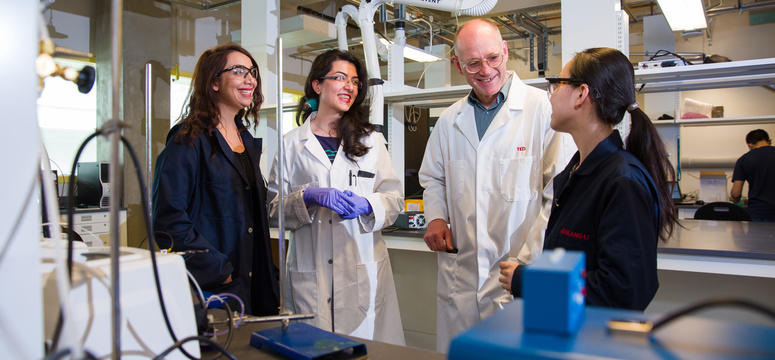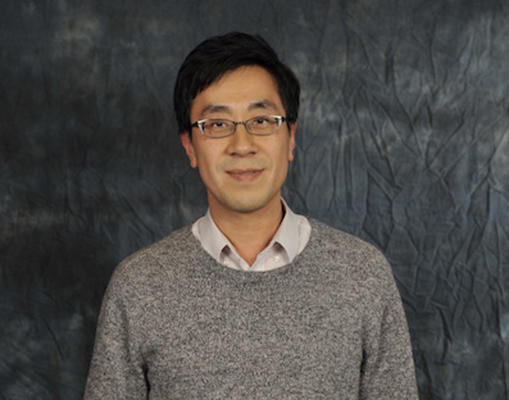Aug. 13, 2018
Industry, government and academia collaborate to advance cyber security, big data, and oil and gas water treatment

Ted Roberts was awarded NSERC funding for the project Electrochemical Water Treatment Processes.
Riley Brandt, University of Calgary
Collaboration, training, and technology transfer between researchers and industry or government are central to three newly funded projects at the University of Calgary. The Natural Sciences and Engineering Research Council of Canada’s Strategic Partnership Grant program (NSERC SPG) supports research that creates new knowledge and technology in areas that will strongly enhance Canada’s economy, society, or environment within the next 10 years.
“I commend today’s recipients for the important work they are doing to contribute to Canada’s competitiveness,” says Kirsty Duncan, minister of science and sport. “We are investing in you today because we know that when we invest in science and research we are investing in Canadians.”
“Partnerships mobilize our research in industries where we can address a critical need,” says Dr. Ed McCauley, vice-president (research). “These projects are driving innovation in science and engineering, and the support of NSERC will enable researchers to pursue novel ideas that will have a tangible impact on the lives of Canadians.”
Creating quantum cybersecurity for Canada
A team led by Dr. Christoph Simon, PhD, professor in the Faculty of Science, will create an alternative to current cybersecurity techniques that will become outmoded when quantum computing becomes the norm. Simon and colleagues, including Dr. Daniel Oblak, PhD, of the Faculty of Science, and partners at the Universities of Ottawa and Waterloo, are focused on information in transit (as opposed to stored, like on your home computer). They plan to develop and implement protocols for Quantum Key Distribution (QKD) — a technique yielding un-hackable communication security to fend off cyberattacks. The technology and know-how of QKD will also serve as the foundation of future quantum computer networks.
Homegrown technology is critical to the project, as foreign encryption technology could leave Canadians’ data vulnerable to “backdoor” information leaks. In collaboration with the National Research Council, the City of Calgary, and the Government of Canada, Simon will assess the use of QKD for securing data, and the potential of this tech to help form a coast-to-coast quantum computer network.

Christoph Simon was awarded NSERC funding for the project Quantum-Secured Communications for Canada.
Christoph Simon
Replicating human decision-making in automated big data analysis
Dr. Henry Leung, PhD, professor in the Schulich School of Engineering, will develop software that detects anomalies in big data using the Observe, Orient, Decide, Act model of human decision-making. When organizations are gathering big data to improve their decision-making, it often comes from multiple sources in various outputs. Detecting irregularities in that data is further complicated by the tendency of anomalies to change over time, which necessitates a system that can learn continuously.
Leung’s system, being developed with Defence Research and Development Canada, General Dynamics Mission Systems Canada, Hifi Engineering, and Larus Technologies, will replicate human decision-making and be capable of autonomously processing multiple, continuous sets of data in a dynamic environment. It will be tested on airborne sensing and pipeline monitoring, and assessed for its ability to detect anomalies as part of faster, real-time monitoring and analysis of big data.

Henry Leung was awarded funding for Information Fusion Approach for Anomaly Detection in Big Data.
Henry Leung
Removing oil and gas water contaminants with electrochemical technology
Dr. Ted Roberts, PhD, professor in the Schulich School of Engineering, will develop electrochemical treatment technology for produced water from oil and gas processes. The treatment can remove several contaminants in one step, while reducing the production of sludge, use of chemical additives, and the need for multiple treatment operations.
Through in-situ visualization of the treatment process, Roberts and co-investigators Dr. Milana Trifkovic, PhD, assistant professor in the Schulich School of Engineering, and Dr. Anh Pham, assistant professor at Carleton University, will see contaminants being removed as it happens. Increased understanding of the mechanisms of contaminant removal will help them refine their approach, to further increase water recycle rates and minimize environmental impacts. In collaboration with Canadian Natural Resources Limited, and Ground Effects Environmental Services Inc., Roberts will develop the technology for use in oil and gas, with an eye on how they could be adapted for potable water, industrial wastewater, and greywater recycling.
Full list of awards:
-
Christoph Simon, Faculty of Science (Co-applicants: T. Jennewein, University of Waterloo; D. Dalacu, University of Ottawa): Quantum-secured communications for Canada (QSC2)
-
Henry Leung, Schulich School of Engineering (Co-applicant: F. Karry, University of Waterloo): Information fusion approach for anomaly detection in big data
- Edward (Ted) Roberts, Schulich School of Engineering (Co-applicants: M. Trifkovic, University of Calgary; A. Pham, Carleton University): Electrochemical water treatment processes for the oil and gas industry
